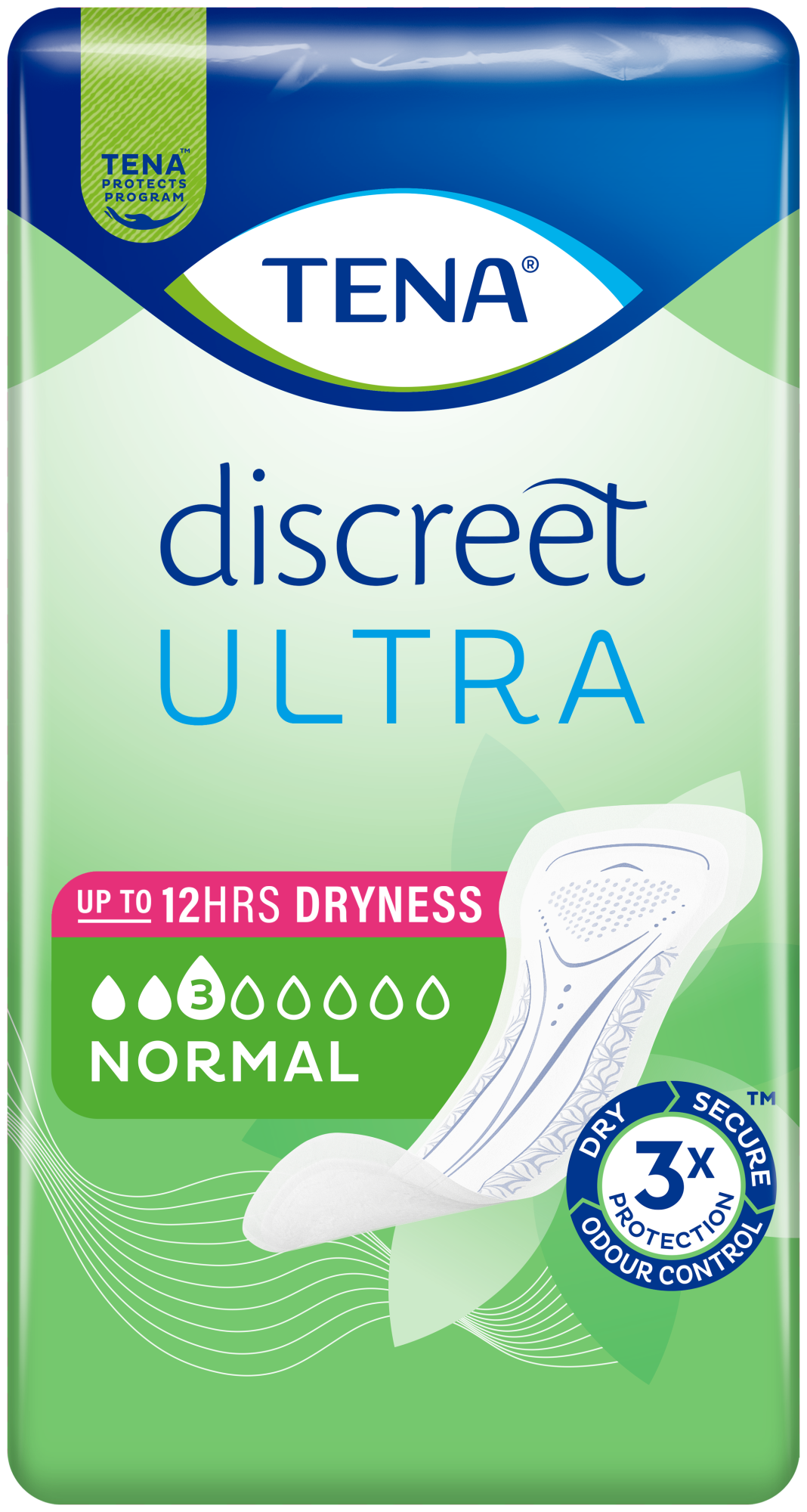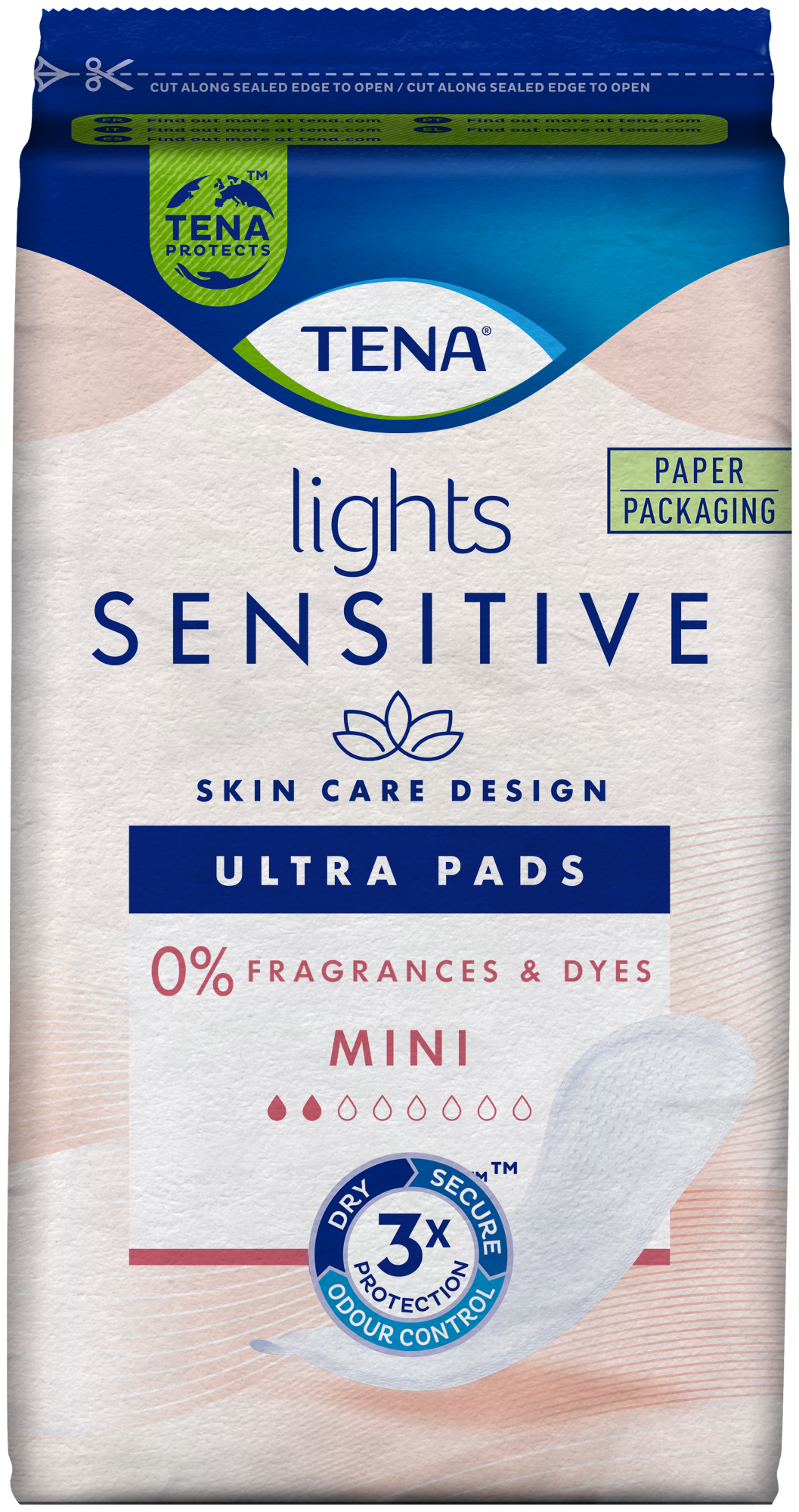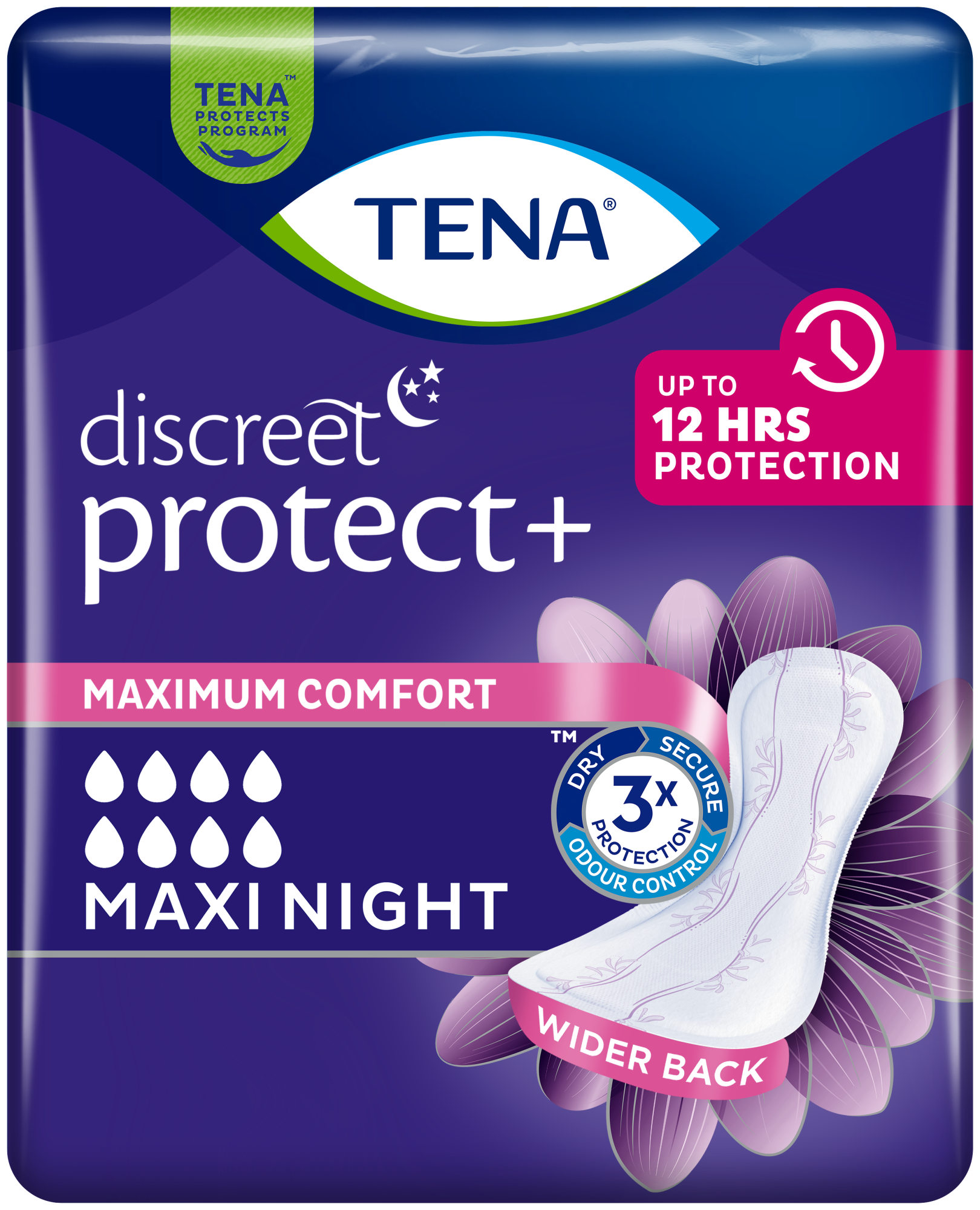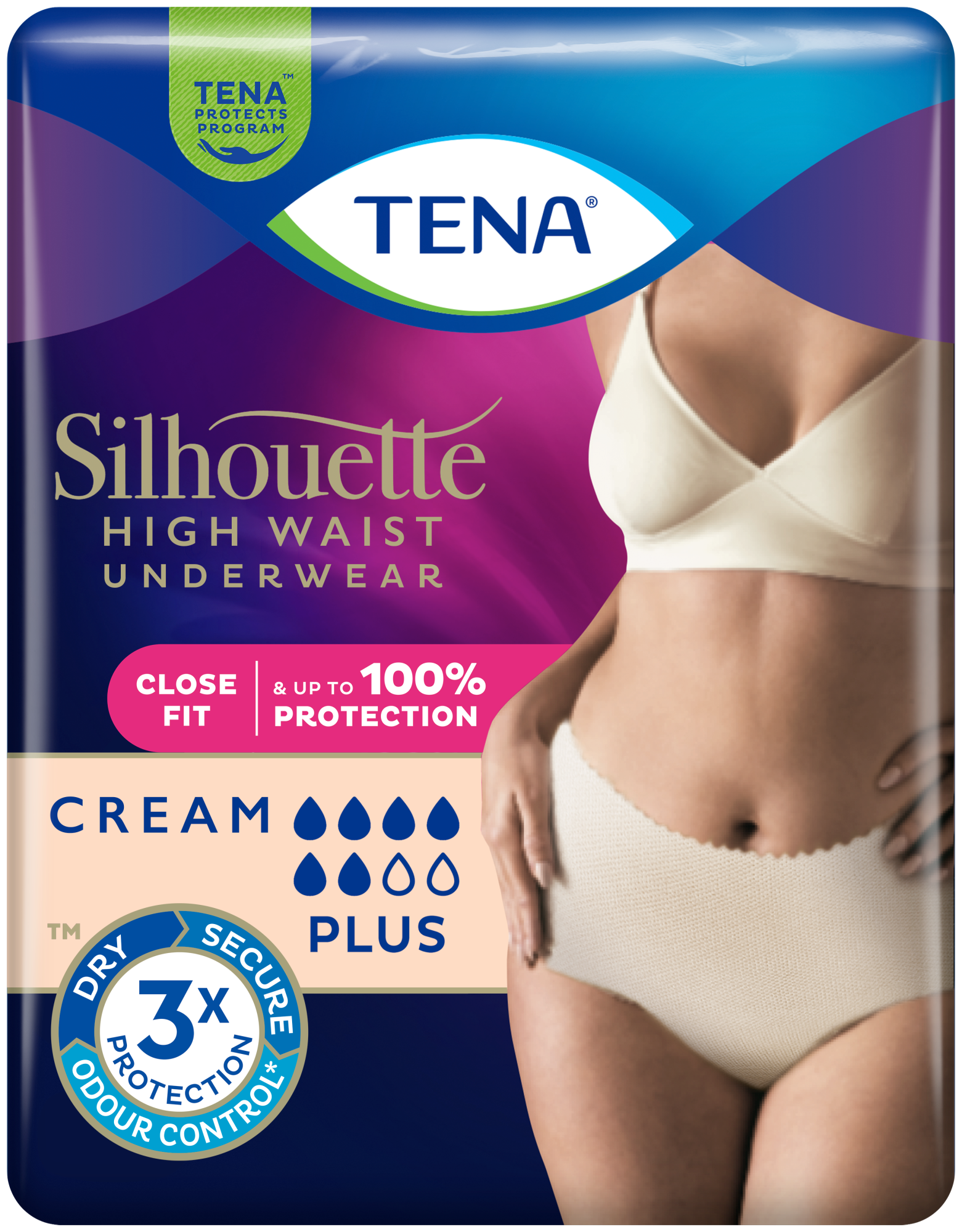
Carrying a baby around for nine months and giving birth affects our bladder and pelvic floor in all kinds of ways, which can mean that we experience leaks (also known as 'incontinence') – especially when we cough, sneeze, laugh or exercise. This is all very common, but rest assured, there are lots of things you can do to manage and improve your symptoms – and TENA can support you with a whole range of pads and liners designed to keep you dry and comfortable. Here, nine women share their experiences, and we share our top tips…
The dreaded sneeze
“That it’s normal when you’re pregnant, especially in the third trimester when you’re carrying more baby weight, to wet yourself when you least expect it. I was about seven months pregnant, lying in a hammock in a garden and reading a book whilst enjoying the sunshine when I sneezed (damn hay fever) and completely emptied my bladder. I got some pads after that – and stayed on top of my antihistamines!”
Chloe, 35
Peeing yourself laughing
“Towards the end of my first pregnancy I wet myself after laughing hysterically for about five minutes. Eventually, the muscles down there couldn’t hold my pee in anymore, and that was it – I peed myself. That’s when I knew pregnancy was starting to take a toll on my pelvic floor and bladder!”
Rosie, 36
The super cold leaks
“I was so into throughout pregnancy, and in the weeks after childbirth, so I didn’t think leaks would be a problem for me. I had a check-up with a women’s physio at six weeks post-partum who checked my pelvic floor and general healing – everything was looking great, so I got a bit complacent and over time, stopped doing the pelvic floor exercises. Fast-forward a year, and I was hit by the worst post-pandemic super cold. Every time I coughed; I peed a little. And that’s a lot of pee when you’re coughing every 5 minutes! It took me way too long to buy proper pads – you just think it will go away or it’s not a big deal, but you don’t have to be uncomfortable. Now I’m back into the pelvic floor exercises and it’s made all the difference. Just goes to show you need to do them every day, not just when you’re pregnant or straight after birth!”
Steph, 33
"I wish I knew that it’s normal to pee yourself in the days immediately after labour because you can’t feel anything down there."
Sarah, 37
Losing all bladder control
“I wish I knew that it’s normal to pee yourself in the days immediately after labour because you can’t feel anything down there. I was still numb from the anaesthetic and where I’d had a catheter removed. Luckily, I was wearing proper maternity pads – but it was a shock to lose all bladder control.”
Sarah, 37
The active leaker
“I really like running, but found that towards the end of my pregnancy, and for a few months after having the baby, I would leak urine as I ran. I even wet myself a couple of times! It was really disheartening at first, as I felt like I couldn’t do what I’d always enjoyed doing – but I’ve found that emptying my bladder properly right before I go for a run and wearing proper pads helps. I’ve also been working on my pelvic floor and have already noticed that I’m leaking a lot less.”
Kelly, 34
"I’ve found that emptying my bladder properly right before I go for a run and wearing proper pads helps. I’ve also been working on my pelvic floor and have already noticed that I’m leaking a lot less."
Kelly, 34
Leaking while coughing
“Almost two years after having my son, I had a persistent cough and weed myself nearly every time I’ve had a coughing fit. It was a nightmare with my job as I’m an orthopaedic surgeon – I had to bring endless spare pants to work and got through so many scrubs. It was making me miserable! Looking back, I should have just used pads, but I think I was in denial. You just hope it will go away on its own, but that’s not how it works.”
Rebecca, 38
The you’re not-finished-yet leaks
“I’ve had two kids and both times struggled with for about a month after birth. For me, I’d go to pee, think that I’m finished, then stand up and realise there’s more just as I went to pull my pants up – thank goodness for reusable maternity pads and liners!"
Bryn, 40
Peeing after an episiotomy
“A whole 18 months had passed before I saw a women’s physiotherapist to get my issues sorted. I had quite a long and traumatic birth and needed to have an episiotomy, but I had no idea what impact that would have on my pelvic floor and recovery. I wasn’t peeing myself a lot, but I was needing to wee way more often than normal and the need to go was really urgent. I had seconds to get to the toilet to avoid weeing myself. After a few sessions with the physio and practicing my , I’m weeing less often and can hold it in for much longer.”
Naomi, 37
The morning sickness leaks
“When I was pregnant, I suffered with morning sickness for a long time and would pee myself every time I was sick, which was multiple times a day. Then after birth, it was triggered by coughing. In all honesty, I’ve never prioritised doing – I don’t think I understood just how much pregnancy and childbirth can impact your bladder and how important they are. They are one of those things that get pushed to the bottom of the to do list as you prioritise everyone and everything else!”
Amy, 31
How to manage pregnancy and post-partum bladder weakness
It’s common for women to ignore their symptoms or avoid seeking professional support, but you don’t have to put up with feeling uncomfortable. From regular pelvic floor exercise and taking the time to empty your bladder properly to retraining your bladder so that you feel the urge to pee less frequently – there are lots of ways that you can manage and improve your symptoms. Check out our detailed article for top tips and advice.
"After a few sessions with the physio and practicing my pelvic floor exercises, I’m weeing less often and can hold it in for much longer."
Naomi, 37
Finding the right incontinence pads
Wearing the right liners means that you can relax whatever cough, sneeze or laughing fit life throws at you. You might be tempted to use standard menstrual pads, but these won’t offer the right levels of absorption that a liner specifically designed to deal with urine leakage will.
If you’re experiencing light leaks during pregnancy, TENA’s Discreet Ultra Mini Incontinence Liner provides triple the protection from leaks, odour and moisture thanks to its unique microPROTEX™ technology. It’s super absorbent and no larger than a menstrual pad.
In the weeks after birth, you’ll need pads with heavier absorbency levels. TENA Discreet Protect+ pads lock in odour and moisture, allowing you to stay dry for up to 12 hours.
Over time, as the leaks get lighter, you can move to a liner such as TENA Discreet Ultra Mini Incontinence Liner, or if your skin is sensitive after childbirth, TENA Lights Sensitive Normal Incontinence Liners are fast-absorbing, very discreet and have 0% fragrance or dye for gentle protection.
TENA is here to help you navigate your pregnancy and post-partum journey, with practical advice for pregnancy and post-partum incontinence. If you feel that you need more support, don’t hesitate to contact a healthcare professional, like your nearest GP. We have a huge range of products designed to support you – check out the full range here and don’t hesitate to contact us if you can’t find the right product for you.
TENA is here to help you navigate your pregnancy and post-partum journey, with practical advice for pregnancy and post-partum incontinence. If you feel that you need more support, don’t hesitate to contact a healthcare professional, like your nearest GP. We have a huge range of products designed to support you – check out the full range here and don’t hesitate to contact us if you can’t find the right product for you.







